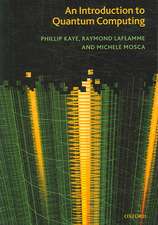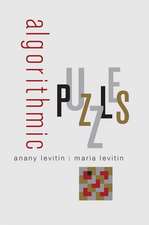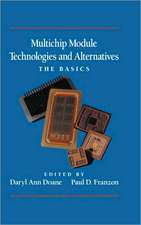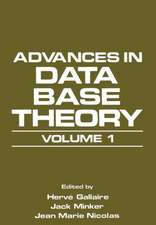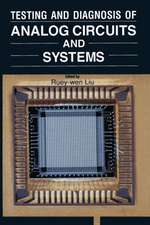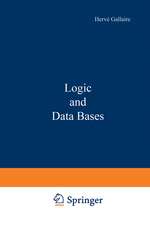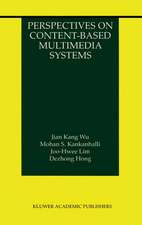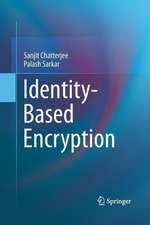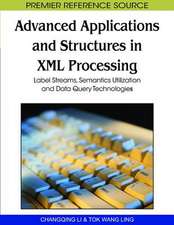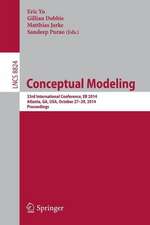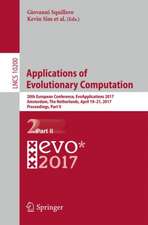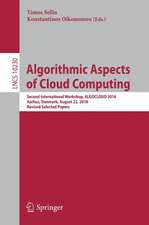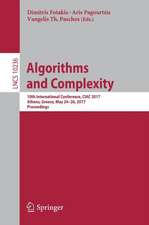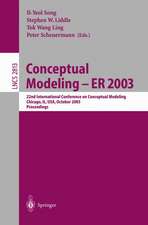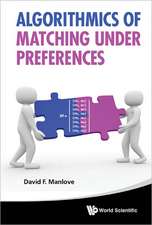Semistructured Database Design: Web Information Systems Engineering and Internet Technologies Book Series, cartea 1
Autor Tok Wang Ling, Gillian Dobbieen Limba Engleză Hardback – 19 noi 2004
This volume responds to that need by describing a semantically rich data model for semistructured data, called Object-Relationship-Attribute model for Semistructured data (ORA-SS). Focusing on this new model, the book discusses problems and presents solutions for a number of topics, including schema extraction, the design of non-redundant storage organizations for semistructured data, and physical semistructured database design, among others.
Semistructured Database Design presents researchers and professionals with the most complete and up-to-date research in this fast-growing field.
| Toate formatele și edițiile | Preț | Express |
|---|---|---|
| Paperback (1) | 640.51 lei 6-8 săpt. | |
| Springer Us – 6 dec 2010 | 640.51 lei 6-8 săpt. | |
| Hardback (1) | 646.80 lei 6-8 săpt. | |
| Springer Us – 19 noi 2004 | 646.80 lei 6-8 săpt. |
Preț: 646.80 lei
Preț vechi: 808.50 lei
-20% Nou
Puncte Express: 970
Preț estimativ în valută:
123.80€ • 134.52$ • 104.06£
123.80€ • 134.52$ • 104.06£
Carte tipărită la comandă
Livrare economică 21 aprilie-05 mai
Preluare comenzi: 021 569.72.76
Specificații
ISBN-13: 9780387235677
ISBN-10: 0387235671
Pagini: 178
Ilustrații: XVI, 178 p.
Dimensiuni: 155 x 235 x 18 mm
Greutate: 0.45 kg
Ediția:2005
Editura: Springer Us
Colecția Springer
Seria Web Information Systems Engineering and Internet Technologies Book Series
Locul publicării:New York, NY, United States
ISBN-10: 0387235671
Pagini: 178
Ilustrații: XVI, 178 p.
Dimensiuni: 155 x 235 x 18 mm
Greutate: 0.45 kg
Ediția:2005
Editura: Springer Us
Colecția Springer
Seria Web Information Systems Engineering and Internet Technologies Book Series
Locul publicării:New York, NY, United States
Public țintă
ResearchCuprins
Data Models for Semistructured Data.- ORA-SS.- Schema Extraction.- Normalization.- Views.- Physical Database Design.- Conclusion.
Recenzii
From the reviews of the first edition:
"This book covers schema extraction from an Extensible Markup Language (XML) data instance, algorithmic normalization of that schema … and the discussion of relaxing the normalization to effect more efficient retrievals. … Database designers and students are obvious targets for this book … . The book is easy to read, and provides an approach to a very practical contemporary problem. The authors have organized their material for easy reading." (E.A. Unger, Computing Reviews, April, 2005)
"Semistructured data are especially applied in web-applications. … The book is written in English. It is recommended to both practitioners and researchers/students, who have to deal with the design and storage organization of semistructured data." (Waltraud Gerhardt, Zentralblatt MATH, Vol. 1076, 2006)
"This book covers schema extraction from an Extensible Markup Language (XML) data instance, algorithmic normalization of that schema … and the discussion of relaxing the normalization to effect more efficient retrievals. … Database designers and students are obvious targets for this book … . The book is easy to read, and provides an approach to a very practical contemporary problem. The authors have organized their material for easy reading." (E.A. Unger, Computing Reviews, April, 2005)
"Semistructured data are especially applied in web-applications. … The book is written in English. It is recommended to both practitioners and researchers/students, who have to deal with the design and storage organization of semistructured data." (Waltraud Gerhardt, Zentralblatt MATH, Vol. 1076, 2006)
Textul de pe ultima copertă
Semistructured Database Design provides an essential reference for anyone interested in the effective management of semsistructured data. Since many new and advanced web applications consume a huge amount of such data, there is a growing need to properly design efficient databases.
This volume responds to that need by describing a semantically rich data model for semistructured data, called Object-Relationship-Attribute model for Semistructured data (ORA-SS). Focusing on this new model, the book discusses problems and presents solutions for a number of topics, including schema extraction, the design of non-redundant storage organizations for semistructured data, and physical semistructured database design, among others.
Semistructured Database Design, presents researchers and professionals with the most complete and up-to-date research in this fast-growing field.
This volume responds to that need by describing a semantically rich data model for semistructured data, called Object-Relationship-Attribute model for Semistructured data (ORA-SS). Focusing on this new model, the book discusses problems and presents solutions for a number of topics, including schema extraction, the design of non-redundant storage organizations for semistructured data, and physical semistructured database design, among others.
Semistructured Database Design, presents researchers and professionals with the most complete and up-to-date research in this fast-growing field.
Caracteristici
Describes a semantically rich data model for semistructured data, called Object-Relationship-Attribute model for Semistructured data (ORA-SS) Focusing on this new model, the book discusses problems and present solutions for a number of topics, including schema extraction, the design of non-redundant storage organizations for semistructured data, and physical semistructured database design, among others Includes supplementary material: sn.pub/extras






